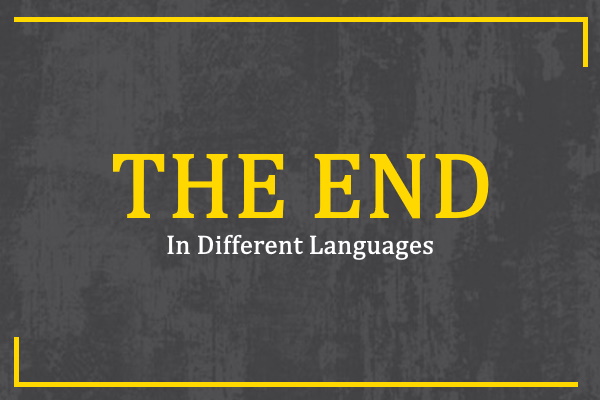Table of Contents
End in Different Languages: End, a small word with immense understanding dependent on various individual with diversified intellect and acknowledgement. The meaning highlight final part of something which may defined through time, period, activity or a story. In other words, something which is extreme and furthest from one focal point.
End in All Languages
Translation of word End in almost 100+ different languages of the world.
| Different Languages | Word The End |
|---|---|
| Albanian | fund |
| Basque | end |
| Belarusian | канец |
| Bosnian | kraj |
| Bulgarian | край |
| Catalan | final |
| Croatian | kraj |
| Czech | konec |
| Danish | ende |
| Dutch | einde |
| Estonian | lõpp |
| Finnish | pää |
| French | fin |
| Galician | final |
| German | Ende |
| Greek | τέλος (télos) |
| Hungarian | vég |
| Icelandic | Enda |
| Irish | deireadh |
| Italian | fine |
| Latvian | beigas |
| Lithuanian | galas |
| Macedonian | крајот |
| Maltese | aħħar |
| Norwegian | slutt |
| Polish | koniec |
| Portuguese | fim |
| Romanian | Sfârşit |
| Russian | конец (Konets) |
| Serbian | крај (kraj) |
| Slovak | koniec |
| Slovenian | konec |
| Spanish | fin |
| Swedish | slutet |
| Ukrainian | кінець (kinets') |
| Welsh | diwedd |
| Yiddish | עק |
| Armenian | վերջ |
| Azerbaijani | son |
| Bengali | শেষ |
| Chinese Simplified | 结束 (jiéshù) |
| Chinese Traditional | 結束 (jiéshù) |
| Georgian | დასასრული |
| Gujarati | અંત |
| Hindi | समाप्त |
| Hmong | kawg |
| Japanese | 終わり |
| Kannada | ಕೊನೆಯಲ್ಲಿ |
| Kazakh | Соңы |
| Khmer | ចុងបញ្ចប់ |
| Korean | 종료 (jonglyo) |
| Lao | ໃນຕອນທ້າຍ |
| Malayalam | അവസാനിക്കുന്നു |
| Marathi | शेवटी |
| Mongolian | Төгсгөл |
| Myanmar (Burmese) | အဆုံး |
| Nepali | अन्त |
| Sinhala | අවසානය |
| Tajik | Поён |
| Tamil | இறுதியில் |
| Telugu | ముగింపు |
| Thai | ปลาย |
| Turkish | son |
| Urdu | آخر |
| Uzbek | oxiri |
| Vietnamese | kết thúc |
| Arabic | النهاية (alnihaya) |
| Hebrew | סוֹף |
| Persian | پایان |
| Afrikaans | einde |
| Chichewa | TSIRIZA |
| Hausa | karshen |
| Igbo | njedebe |
| Sesotho | QETA |
| Somali | dhamaadka |
| Swahili | mwisho |
| Yoruba | opin |
| Zulu | ukuphela |
| Cebuano | katapusan |
| Filipino | katapusan |
| Indonesian | akhir |
| Javanese | pungkasan |
| Malagasy | tapitra |
| Malay | akhir |
| Maori | mutunga |
| Esperanto | fino |
| Haitian Creole | fen |
| Latin | finis |
End in European Languages
Translation of word End in almost 42 European languages.
| Different Languages | Word End |
|---|---|
| Albanian | fund |
| Basque | end |
| Belarusian | канец |
| Bosnian | kraj |
| Bulgarian | край |
| Catalan | final |
| Corsican | fine |
| Croatian | kraj |
| Czech | konec |
| Danish | ende |
| Dutch | einde |
| Estonian | lõpp |
| Finnish | pää |
| French | fin |
| Frisian | ein |
| Galician | final |
| German | Ende |
| Greek | τέλος [télos] |
| Hungarian | vég |
| Icelandic | Enda |
| Irish | deireadh |
| Italian | fine |
| Latvian | beigas |
| Lithuanian | galas |
| Luxembourgish | Enn |
| Macedonian | крајот |
| Maltese | aħħar |
| Norwegian | slutt |
| Polish | koniec |
| Portuguese | fim |
| Romanian | Sfârşit |
| Russian | конец [Konets] |
| Scots Gaelic | deireadh |
| Serbian | крај [kraj] |
| Slovak | koniec |
| Slovenian | konec |
| Spanish | fin |
| Swedish | slutet |
| Tatar | ахыр |
| Ukrainian | кінець [kinets'] |
| Welsh | diwedd |
| Yiddish | עק |
End in Asian Languages
Translation of word End in almost 36 Asian languages.
| Different Languages | Word End |
|---|---|
| Armenian | վերջ |
| Azerbaijani | son |
| Bengali | শেষ |
| Chinese Simplified | 结束 [jiéshù] |
| Chinese Traditional | 結束 [jiéshù] |
| Georgian | დასასრული |
| Gujarati | અંત |
| Hindi | समाप्त |
| Hmong | kawg |
| Japanese | 終わり |
| Kannada | ಕೊನೆಯಲ್ಲಿ |
| Kazakh | Соңы |
| Khmer | ចុងបញ្ចប់ |
| Korean | 종료 [jonglyo] |
| Kyrgyz | аягы |
| Lao | ໃນຕອນທ້າຍ |
| Malayalam | അവസാനിക്കുന്നു |
| Marathi | शेवटी |
| Mongolian | Төгсгөл |
| Myanmar (Burmese) | အဆုံး |
| Nepali | अन्त |
| Odia | ଶେଷ |
| Pashto | پای |
| Punjabi | ਅੰਤ |
| Sindhi | آخري |
| Sinhala | අවසානය |
| Tajik | Поён |
| Tamil | இறுதியில் |
| Telugu | ముగింపు |
| Thai | ปลาย |
| Turkish | son |
| Turkmen | soňy |
| Urdu | آخر |
| Uyghur | end |
| Uzbek | oxiri |
| Vietnamese | kết thúc |
End in Middle East Languages
Translation of word End in 4 middle eastern languages.
| Different Languages | Word End |
|---|---|
| Arabic | النهاية [alnihaya] |
| Hebrew | סוֹף |
| Kurdish (Kurmanji) | dawî |
| Persian | پایان |
End in African Languages
Translation of word End in almost 13 African languages.
| Different Languages | Word End |
|---|---|
| Afrikaans | einde |
| Amharic | ጨርስ |
| Chichewa | TSIRIZA |
| Hausa | karshen |
| Igbo | njedebe |
| Kinyarwanda | iherezo |
| Sesotho | QETA |
| Shona | magumo |
| Somali | dhamaadka |
| Swahili | mwisho |
| Xhosa | isiphelo |
| Yoruba | opin |
| Zulu | ukuphela |
End in Austronesian Languages
Translation of word End in almost 10 Austronesian languages.
| Different Languages | Word End |
|---|---|
| Cebuano | katapusan |
| Filipino | katapusan |
| Hawaiian | hoʻopau |
| Indonesian | akhir |
| Javanese | pungkasan |
| Malagasy | tapitra |
| Malay | akhir |
| Maori | mutunga |
| Samoan | iʻuga |
| Sundanese | tungtung |
End in Other Foreign Languages
| Different Languages | Word End |
|---|---|
| Esperanto | fino |
| Haitian Creole | fen |
| Latin | finis |
More Information about End
We apply these three set of syllables in our daily routine numerously, like a student would say “Well I got an A in the end” or an author would climax his writings like “In the end they lived happily ever after” or a pessimist would rather say ”We all are going to die in the end”.
This laminates the fact that this single word can differentiate any situation through the gaps of its meaning whether towards positivity or negativity, hope or frustration.
The origin of ‘END’ is derived from Germanic and Dutch linguistics Einde and Eindian which later converted to old English as Ende and then to modern English as an End.
In Spanish it is final which resemble the English word Final and it can be proved how these languages share history and vocabulary through ages.
But the origin of the first civilization is the origin of everything we know and learnt today, which is Greece.
Greek were the first one to name this kind of action into a word which was TὲLOG or TELIOS. While in Urdu its Khatam, in Mandarin its Jieshu and in Russian its Konets.
In Greek mythology, when any object started to get smaller from one to point to other, the Greeks believed that the specific object has come to an end and gone for good.
Like this, different religions have their own different beliefs on what end is. Like Islam reveals that in the end there will be Day of Judgement, while some religion believes that there is no end but eternal life.
But in contrast everything in this world has an end and a limit, what we humans can do is to utilize what we have to its maximum until it’s the end and we are too late.
The word end in different languages has many names. You can also use other words in place of end like last, finish, gone, bye or done.
From person to person the word end may not carry identical weight, as someone might got lucky and scored a home run in the last second and their end may be good while the opposing team, which was in lead the whole game, lost in the end. Hence it’s the end which matters the most.

Arslan Hussain, founder of The Different Languages, is an experienced translator passionate about languages and cultures. Through his website, he shares his knowledge and love for different languages, making learning accessible and enjoyable.

